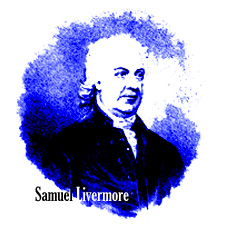|
FRESH STUFF DAILY |
|
|
||
|
|
||
|
|
||
|
SEE ALL SIGNED BOOKS by J. Dennis Robinson click here |
||
He may not be at the top of your list of New Hampshire heroes, but Sam Livermore was in the thick of things. Livermore was close to the last British governor and became land-rich. But when the Revolution came, he served as in the US Senate and as NH Chief Justice, defining the early laws of the state.
MORE Framers of Freedom Member of Contiental Congress, US Senator, Chief Justice of NH Supreme Court, member of Continental Congress -- and more. As a warm friend of the royal governor, a successful lawyer and the virtual master of the remote township of Holderness, Samuel Livermore might well have been pardoned if he had been less than enthusiastic in joining the rebel cause at the outbreak of the Revolution. By 1775, he had moved from Portsmouth and Londonderry to Holderness where, through grants and outright purchases, he had acquired half of the total land area. He constructed housing, mills and a church, and settled into the role of a country squire. Some questioned his patriotic loyalties when he moved away from the political activities in the southern part of the state but his actions were soon forgotten and he became one of New Hampshire's most valued statesmen during the last two decades of the 1700s. Portsmouth Politics Livermore was a native of Waltham, Massachusetts, and a graduate of Princeton. After a year of legal practice in his hometown, he moved to Portsmouth in 1758 and soon had a reputation as a skilled and energetic lawyer. There was no thought of revolution in the late 1750s, and Livermore soon became friendly with Governor Benning Wentworth. His ties to the royal government were further cemented when he married the daughter of the Rev. Arthur Browne, an Anglican minister and close ally of the governor. A few years later, however, as political conflicts arose between the people and the royal government, Livermore moved inland to Londonderry, then the second largest town of the province. He was elected to represent the town in the General Assembly for 1768-70, but in 1769 he was recalled to Portsmouth by Governor John Wentworth and appointed as judge advocate in the Admiralty Court and attorney general. The first appointment was one of the most lucrative and honored positions in the province and indicates the esteem in which he was held by the governor. By 1774, however, he moved back to Londonderry and the next year to Holderness, a migration that many people assumed was an attempt to escape the growing revolt. Continental Congress Livermore must have been an extremely able royal justice and attorney to have been able to satisfy both the governor and the people. It is apparent that he succeeded, for in 1776 the legislature appointed him attorney general for the new state. While he might not have been an outspoken patriot in the early days of the Revolution, he soon became one of the most important members of the civil government. In 1779, he was elected by the General Court as a commissioner to the Continental Congress as a New Hampshire representative in the controversy over the towns along the Connecticut River. He was elected as a full member of the Congress in 1785, '89 and '91. He was also elected to two terms in the U. S. Senate, beginning in 1793, but he resigned during his second term due to ill health. Along with his national activities, Livermore also continued in state politics. He was appointed chief justice of the state Supreme Court and as a member of the state Constitutional Convention in 1788, he was a leader in the ratification of the federal Constitution in New Hampshire. His public career came to an end in 1801 when he left the Senate and returned to Holderness. He died there in 1803 at age 71. © Peter E. Randall. Originally published in "NH: Years of Revolution," Profiles Publications and the NH Bicentennial Commision, 1976. Reprinted by permission of the author. Originally published online here in 1997. SEE ALSO the Livermores of Livermore Street OUTSIDE LINKS NH STATE HISTORIC MARKER Samuel Livermore (1732-1803)
Please visit these SeacoastNH.com ad partners.
News about Portsmouth from Fosters.com |
| Thursday, April 18, 2024 |


|
Copyright ® 1996-2020 SeacoastNH.com. All rights reserved. Privacy Statement
Site maintained by ad-cetera graphics

 Link Free or Die
Link Free or Die



















